

What is Fair Use? » BU Libraries. Differences between new fair dealing and fair use. Legal Definitions: "Fair Use" and "Fair Dealing" Q: If a work remains in copyright, limited quotation is legal within fair use (U.S.) and fair dealing (U.K., etc.) provisions.What are the legal definitions of fair use (U.S.) and fair dealing (U.K., and the like)?
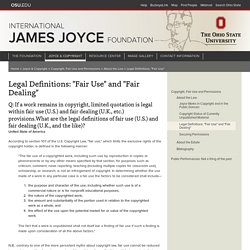
United State of America According to section 107 of the U.S. Copyright Law, "fair use," which limits the exclusive rights of the copyright holder, is defined in the following manner: "The fair use of a copyrighted work, including such use by reproduction in copies or phonorecords or by any other means specified by that section, for purposes such as criticism, comment, news reporting, teaching (including multiple copies for classroom use), scholarship, or research, is not an infringement of copyright.
Fair Dealing, compared to Fair Use. Updated August 2013 In the four years that have passed since I began this blog, fair dealing in Canada has grown in character.
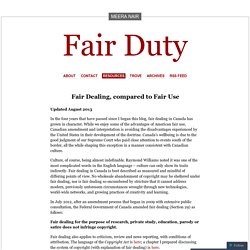
While we enjoy some of the advantages of American fair use, Canadian amendment and interpretation is avoiding the disadvantages experienced by the United States in their development of the doctrine. Canada’s wellbeing is due to the good judgment of our Supreme Court who paid close attention to events south of the border, all the while shaping this exception in a manner consistent with Canadian culture. Culture, of course, being almost indefinable. Raymond Williams noted it was one of the most complicated words in the English language – culture can only show its traits indirectly. In July 2012, after an amendment process that began in 2009 with extensive public consultation, the Federal Government of Canada amended fair dealing (Section 29) as follows:
'Educational Purposes' and copyright, Copyright, University of Otago, New Zealand. People often use 'educational purposes' to mean any copying done by someone who works in an educational institution.
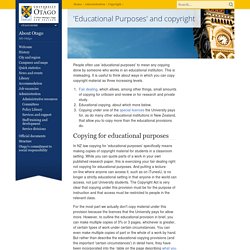
This is misleading. It is useful to think about ways in which you can copy copyright material as three increasing levels. Fair dealing, which allows, among other things, small amounts of copying for criticism and review or for research and private study.Educational copying, about which more below.Copying under one of the special licences the University pays for, as do many other educational institutions in New Zealand, that allow you to copy more than the educational provisions do.
Copyright Overview by Rich Stim. The best way to understand the flexible principle of fair use is to review actual cases decided by the courts.
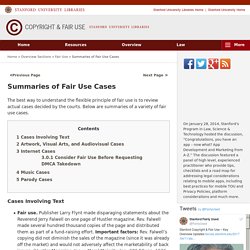
Below are summaries of a variety of fair use cases. Cases Involving Text Fair use. Publisher Larry Flynt made disparaging statements about the Reverend Jerry Falwell on one page of Hustler magazine. Rev. Artwork, Visual Arts, and Audiovisual Cases. What Makes Something Fair? – A close look at fair dealing. When copyright law was first introduced by the Copyright Act 1710, there were no defences available – is a registered book was copying, it was an infringement.
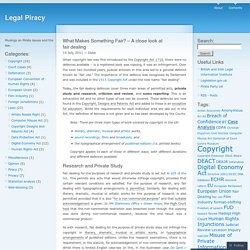
Over the next two hundred years, judicial activism in this area led to a general defence known as “fair use.” The importance of this defence was recognised by Parliament and was included in the 1911 Copyright Act under the new name “fair dealing”. Today, the fair dealing defences cover three main areas of permitted acts; private study and research, criticism and review, and news reporting.
This is an exhaustive list and no other types of use can be covered. These defences are now found in the Copyright, Designs and Patents Act and added to these is an exception for education. Research and Private Study. Copyright Act 1994 No 143 (as at 26 March 2015), Public Act. What is fair dealing with copyright material?, Copyright, University of Otago, New Zealand. Fair dealing (or 'fair use' in some parts of the world) is a key concept in copyright law.
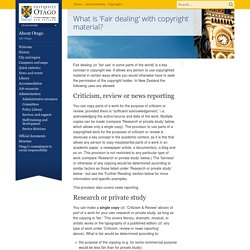
It allows any person to use copyrighted material in certain ways where you would otherwise have to seek the permission of the copyright holder. In New Zealand the following uses are allowed. Criticism, review or news reporting You can copy parts of a work for the purpose of criticism or review, provided there is “sufficient acknowledgement,” i.e. acknowledging the author/source and date of the work. Multiple copies can be made (compare 'Research or private study' below, which allows only a single copy). This provision also covers news reporting. Research or private study You can make a single copy (cf. Note that the 'research or private study' provision applies to the carrying out of research, not to any publication that might arise from that research. Myths about fair dealing Further Reading The following links provide useful general explanations and specific examples from case law.
Copyright Council of New Zealand. The Copyright Act specifies certain circumstances where you can use all or a substantial part of a copyright work without the copyright owner’s permission.
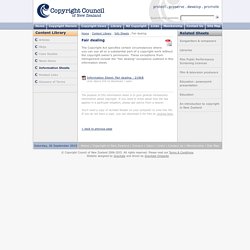
These exceptions from infringement include the “fair dealing” exceptions outlined in this information sheet. Information Sheet: Fair dealing - 219kB click above link to download / open The purpose of this information sheet is to give general introductory information about copyright. If you need to know about how the law applies in a particular situation, please get advice from a lawyer. You'll need a copy of Acrobat Reader on your computer to view this file.